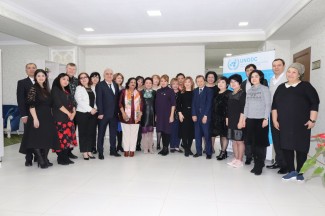18 National Trainers from Central Asia Trained on Advance UTC Courses 14 and 17 in Uzbekistan

24-29 February 2020 - A team of national trainers from Central Asia attended the Universal Treatment Curriculum (UTC) Regional Training of Trainers held in Tashkent, Uzbekistan.
The training was organized by the UNODC Regional Office for Central Asia within the framework of UNODC global project – “Treating drug dependence and its health consequences: Treatnet II”.
18 national trainers (ICAP 1 holders) from Kyrgyzstan, Tajikistan and Uzbekistan were trained on the two following UTC courses:
- Course 14: Working with Families with Substance Use Disorders
- Course 17: Case Management Skills and Practices
Course 14 presented an overview of issues related to drug use in the context of the family and provided participants with an understanding of the interventions that can be carried out with families affected by drug use disorders.
Course 17 provided participants with an overview of the definitions, major functions and case management practices within the drug use disorder continuum of care as well as an understanding of the roles, skills and competencies of case managers.
Prepared national master trainers will be responsible for conducting a series of echo trainings on selected courses of Advanced Level UTC training package for treatment and care professionals from their respective countries.
The training is logical continuation of capacity building activities being implemented in the region since 2010, within the framework of Treatnet project. Building on human resources trained on the evidence-based drug dependence treatment and care approaches, UNODC aims to further strengthen the level of capacity at the national level in the countries of the region.
UNODC stands committed to promoting access to drug dependence treatment, care and rehabilitation services that are based on scientific evidence, through worldwide advocacy, capacity building and expansion of services.